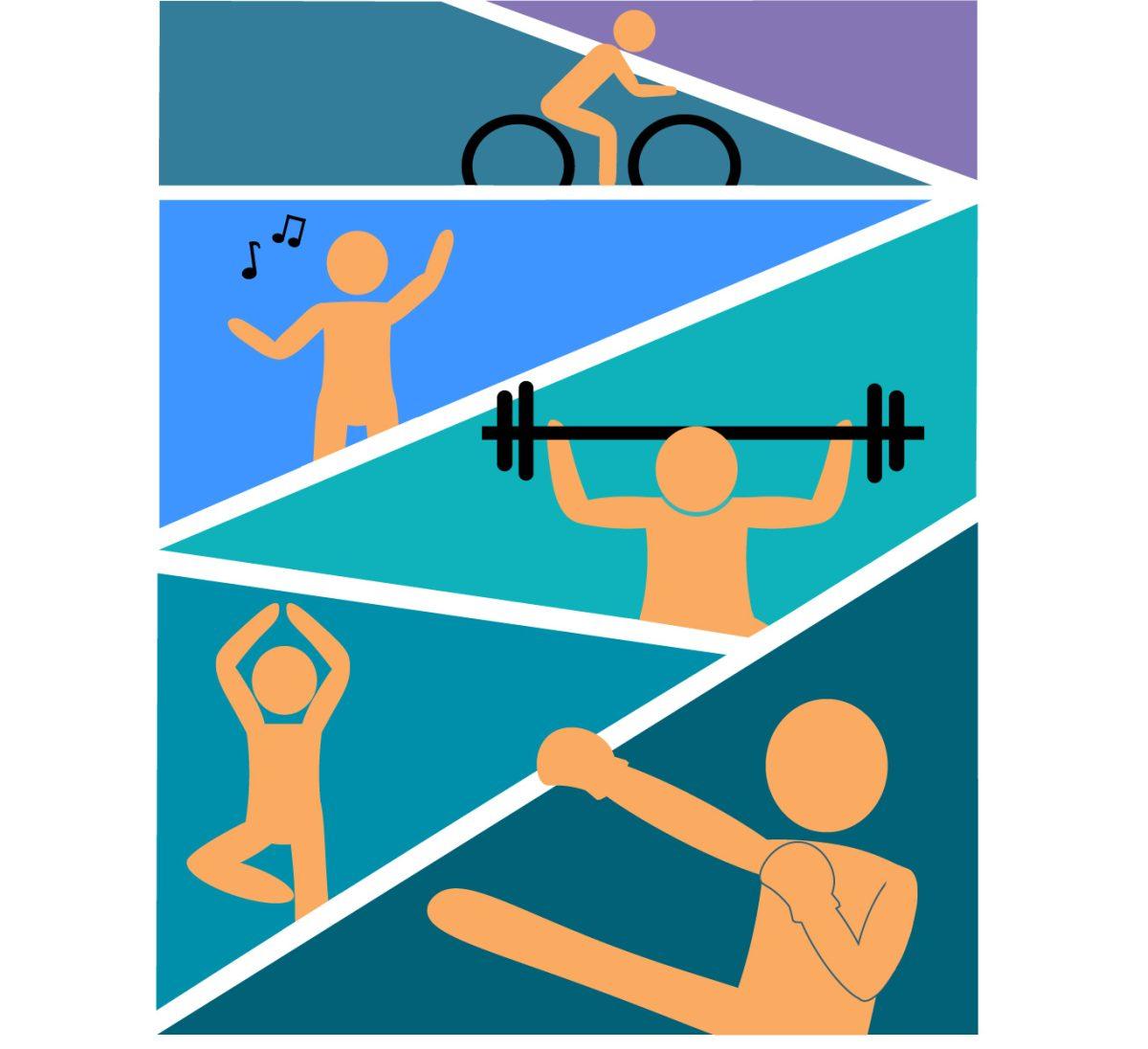
Graphic by Simone de Blanck
Group Fitness Graphic
With the huge variety of fitness courses offered at NC State, deciding which classes to take can be a daunting task.
Every student is required to take one 100-level health course in addition to another 100- or 200-level health course. These include fitness, dance and distance education courses. Each class has a physical and cognitive component, where students participate in physical activity and learn the tenets of wellness.
Brenda Watson, associate department head of the Department of Health and Exercise Studies, said 100-level classes are focused on general fitness, featuring courses like HESF 101: Fitness and Wellness and HESF 107: Run Conditioning. Two hundred-level courses are more skills-focused, like HESR 249: Tennis I and HESR 242: Badminton.
“Two hundred-level classes are more skill-based,” Watson said. “One hundred-level [courses] are more general-fitness-based. They can have anything involved with strength training, running, walking — putting a vast number of stuff together. And with the process of each one, 100- or 200-level, you’ve got to increase your fitness, which is the hope.”
Sarah Ball, an assistant teaching professor in the Department of Health and Exercise Studies, said students can use the course catalog to select which course is their best fit. If they have any additional questions regarding intensity and impact of the course, Ball suggests they reach out to the instructor before enrolling.
“Go look at the course offerings, read the course descriptions, and under each description it’ll give a little description of what the class is going to be about [and] the physical requirements,” Ball said. “That’s going to be important for students making decisions.”
According to Watson, personal preferences can also help students decide which class they should take. Students who are newer to exercise and fitness may want to start with a basic 100-level course.
“If you love running, for example, that run conditioning course might be the course for you,” Watson said. “If you don’t like running too much, but hey, I love to walk, there’s a walking course for you. […] If you hate running and hate walking, you may take golf or something else. So your interest comes into play at this point as well.”
Students also offered their recommendations based on their experiences. Noelle Arpea, a fourth-year in international studies and textile engineering, said she recommends DAN 279: Yoga I and HESF 112: Fitness Kickboxing. Hannah Rosenberger, a fourth-year studying biological sciences, recommended HESF 104: Swim Conditioning.
Jeong Dae Lee, assistant teaching professor for health and exercise studies, said students should assess their goals for the course before changing to satisfactory/unsatisfactory (S/U) grading. A student who really wants to improve their wellness may take it for a grade, while another who only wants to enjoy the class and fulfill their requirement may take it as S/U.
“It’s all up to students,” Lee said. “But I think making a decision whether you take it for satisfactory/unsatisfactory or a grade will change their attitudes when they take the class.”
Watson encouraged students to take their HESF courses as soon as they can, getting the requirement out of the way in case of injury or unforeseen circumstances.
“I wish students would all start taking their health education courses in the beginning as freshmen,” Watson said. “They should not wait until their senior year. One of the biggest things that scares me is when they wait until the second semester senior year to do it all, because these things are required. You should really take them as soon as you can, because if something happens when you get hurt, or you get ill or something, you’ll be able to take it again or do it at another time. But if that happens as a graduating senior, the option disappears.”
Students can also participate in the Take 8 at State challenge by enrolling in eight fitness courses during their college career, one for every semester over four years. Participants receive a water bottle and T-shirt for their commitment. Lee shared the goals of the program.
“The program is made to promote a student’s wellness overall, during their career in school,” Lee said. “As students try to stay healthy and well, we believe taking an HES class each and every semester can alleviate stress and help overall wellness. That is our belief and hope students will participate [in] the Take 8 program.”